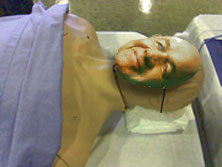A legal precedent could clear Ken Lay, the firm's late founder, making it hard for the US to tap his estate.

By Kris Axtman
If someone is convicted of a crime and dies before exhausting all his appeals, is he innocent?
That's the question now challenging federal prosecutors in the latest twist of the Enron case. A legal precedent could clear the record of Enron founder Kenneth Lay, even though he was found guilty of six counts of conspiracy and fraud, because of his sudden death last month.
The move could also make tens of millions of dollars in his estate off-limits to creditors.
The Justice Department has said it will use all available legal means to reclaim the money related to the criminal charges Mr. Lay was convicted of in May. But those means may be few because of the legal precedent set by the US Fifth Circuit Court of Appeals, which found in 2004 that a person's criminal record is "abated," or wiped out, if he or she dies before having a chance to exhaust all appeals.
The rationale is that someone convicted of a crime should not be denied the right to have the trial's fairness tested, says Brian Wice, a Houston attorney. In this case, it means Lay's conviction, trial, even his indictment will most likely be abated - making him an innocent man.
The lawyer handling Lay's estate has already filed a motion with US District Judge Sim Lake, asking him to erase Lay's criminal record, based on the ruling by the Fifth Circuit, which governors federal courts in Texas.
That may be hard for the public to take, says Ross Albert, an Atlanta lawyer formerly with the Securities and Exchange Commission.
"There is a presumption of innocence that comes before every conviction. But Ken Lay, at the time he died, was not presumed to be innocent," says Mr. Albert, who believes the Fifth Circuit is "zealously" protecting the prerogative of the appeals court even though well over 80 percent of all criminal appeals are denied.
Courts do not see eye to eye on the issue of abatement. Just last week, for instance, the Washington State Supreme Court held that convictions will no longer be vacated when a defendant dies during appeal.
The issue is ripe for US Supreme Court review, but it's unlikely that federal prosecutors, known as the Enron Task Force, will take it that far, experts agree.US to fight abatement but is unlikely to win.
Prosecutors have indicated that they will file a motion opposing the request for abatement, but that would require Judge Lake going against legal precedent - something that most agree is highly unlikely.
In going after Lay's money, "it's back to square one for the government," says Mr. Wice. It can sue either Lay's estate in a civil asset-forfeiture case or his wife, Linda Lay, as the executor of the will. Experts agree that a civil-forfeiture suit is the most likely course of action, given the fact that Mrs. Lay was never charged with a crime and would be a very sympathetic witness.
"But a civil-forfeiture case is going to be very time-consuming and expensive," says David Smith, an Alexandria, Va., lawyer and expert in such cases. "You would essentially have to redo the entire criminal case. And because civil discovery is much broader, the case could drag on for years."
What's most likely to happen, these experts say, is that the government will settle with Lay's estate - something that occurs in the vast majority of civil suits.
But others are clamoring for a share as well.
"There is a long line of civil claimants on the Lay money. So there are all kinds of other ways beyond the criminal case to get that money," says Samuel Buell, a former federal prosecutor on the Enron Task Force who now teaches law at Washington University in St. Louis. "But the longer it takes to get, by virtue of inflation and legal fees, the less there is at the end."
Lay's estate moves to settle suits
Late last week, it appeared that the Lay family was ready to put the litigation behind it. In a civil case brought by employees, lawyers said they were within days of coming to terms with the Lay estate on a settlement over the company's inadequacy in diversifying its retirement plan.
Depending on the sum, that could make the government's settlement plans moot - especially since Lay claimed at trial to have been financially wiped out when Enron's stock became worthless.
Indeed, the Enron Task Force indicated after Lay's death that it will try to hold Jeffrey Skilling, Enron's ex-CEO, accountable for the full amount of restitution. He was found guilty of 19 of the 28 counts he faced.
Prosecutors had initially asked for $139.3 million from Mr. Skilling and $43.5 million from Lay. Now, they are asking Skilling to pay the entire $182.8 million, based on the conspiracy charge, which says anyone involved can be held responsible for 100 percent of the restitution.
In any case, Lay was being asked to forfeit only a tiny fraction of all the money that was lost when Enron collapsed, says Professor Buell. He sees the government's actions as mostly symbolic at this point and says that even if the judge vacates Lay's conviction, it doesn't speak to the merits of the case against him.
No matter the outcome, says Wice, "he's guilty as sin in the public's eye. Try convincing the people in this town otherwise."
No comments:
Post a Comment